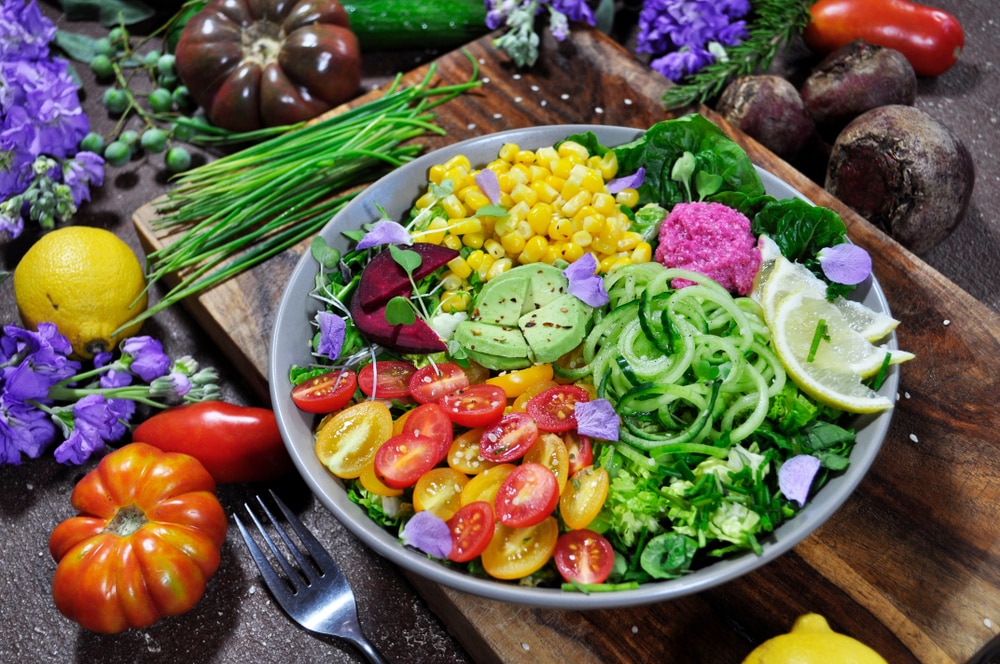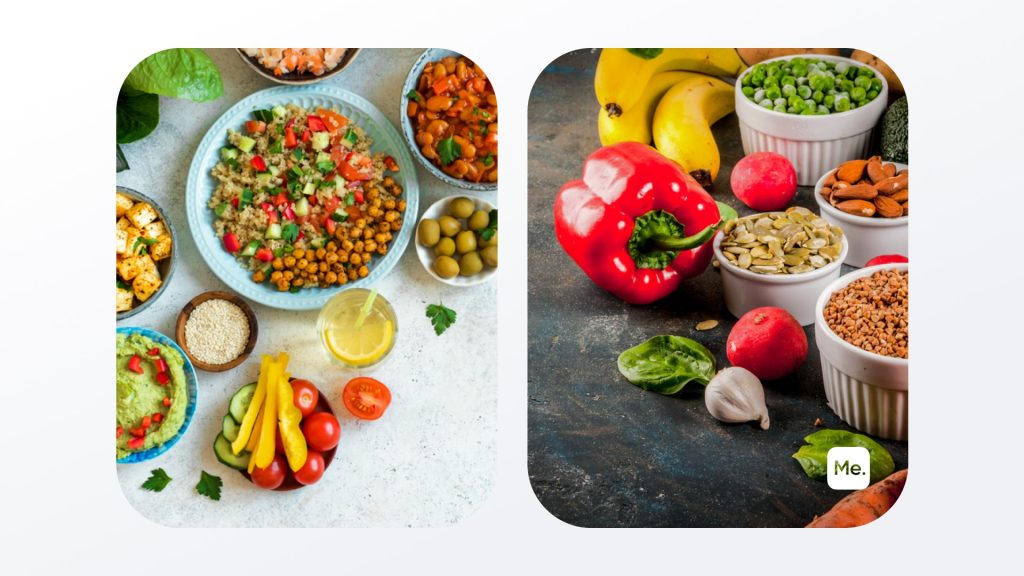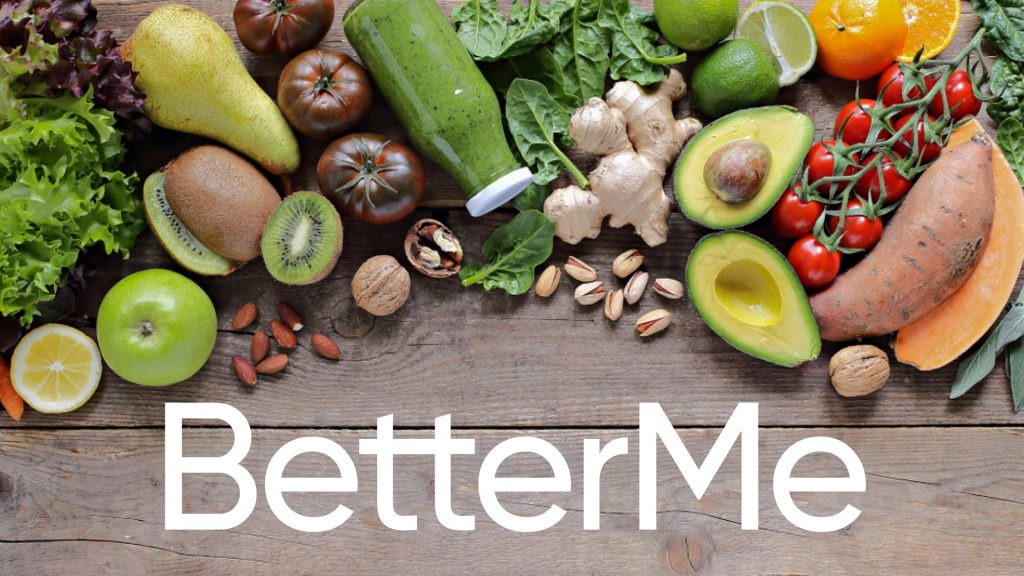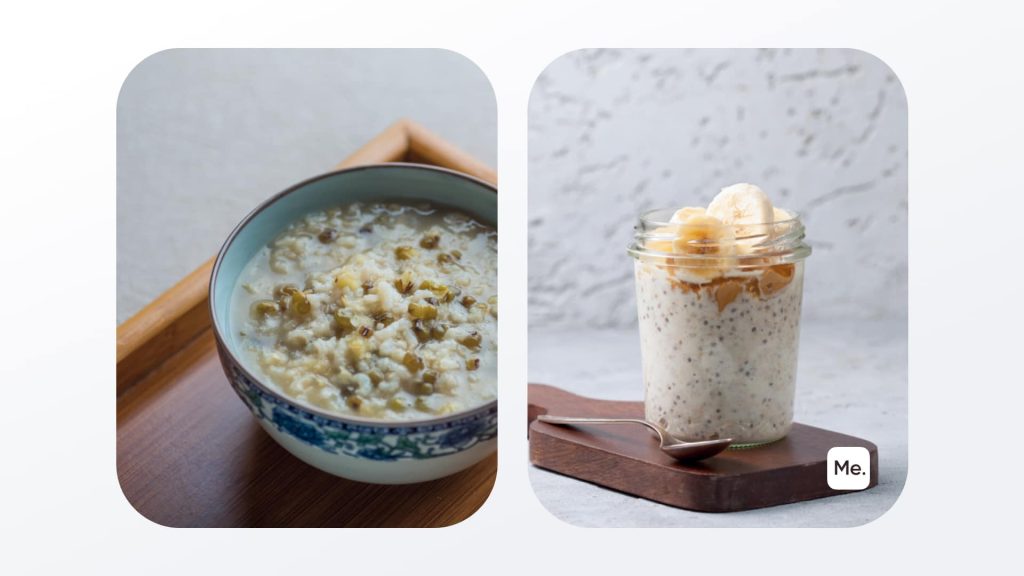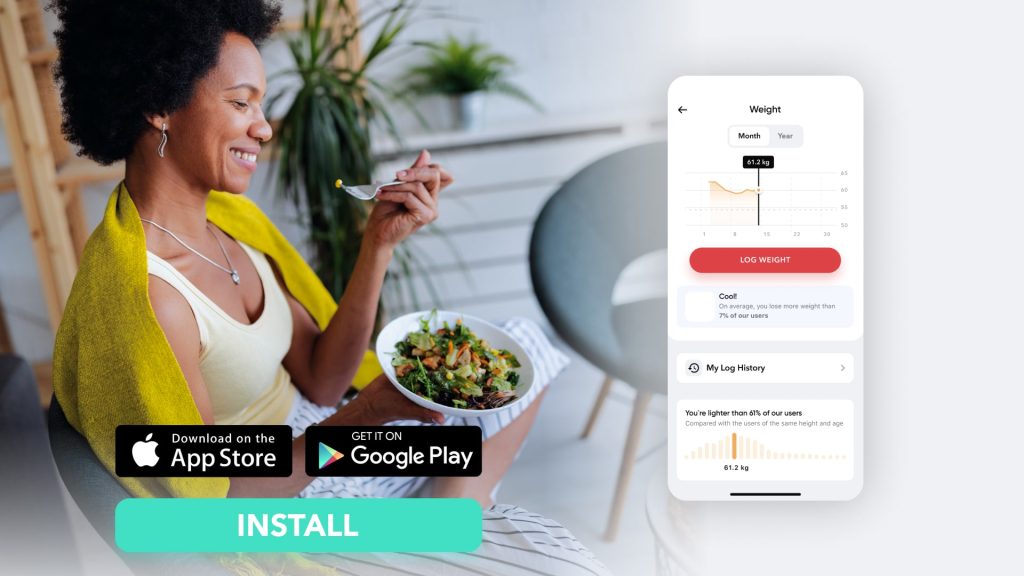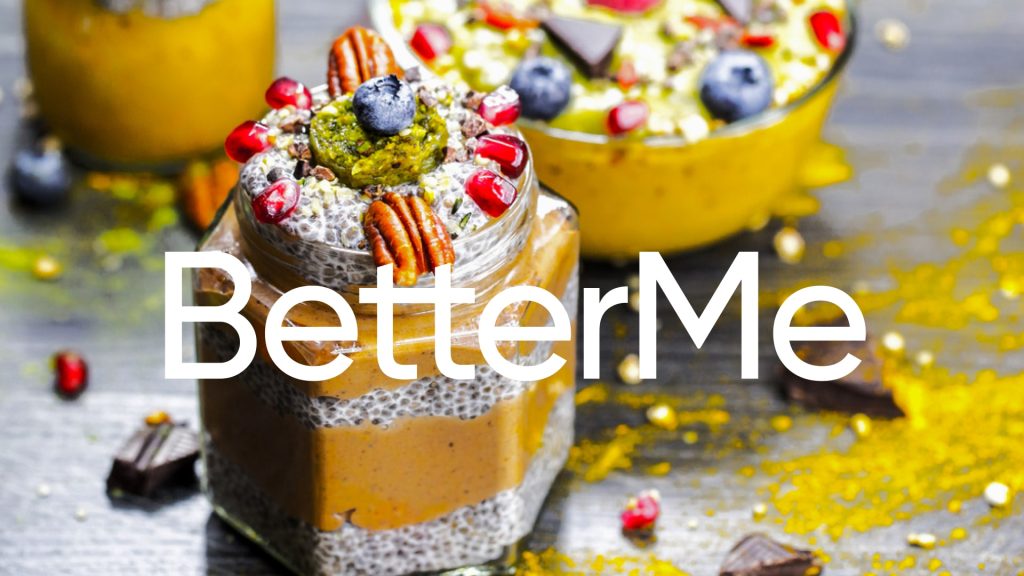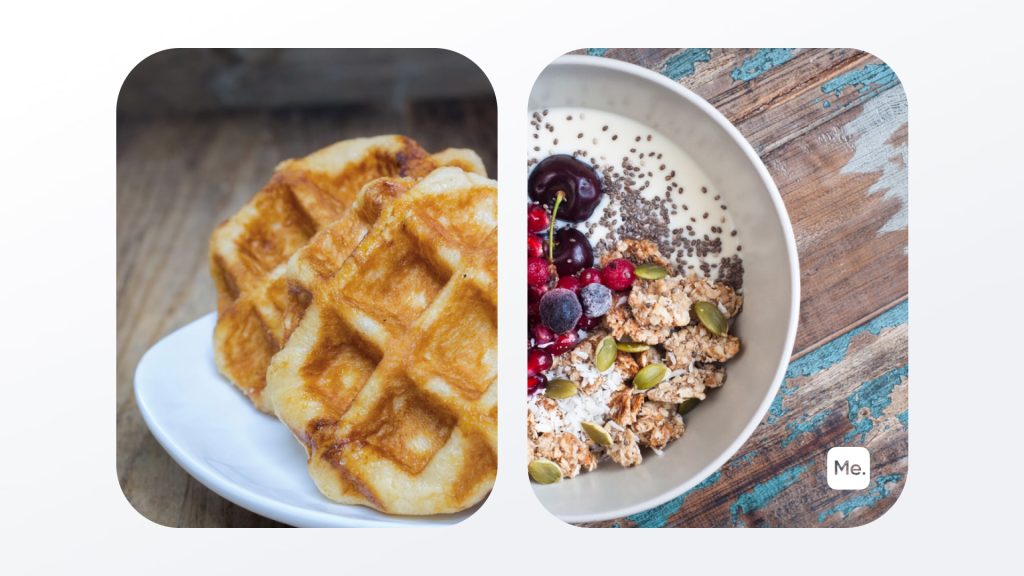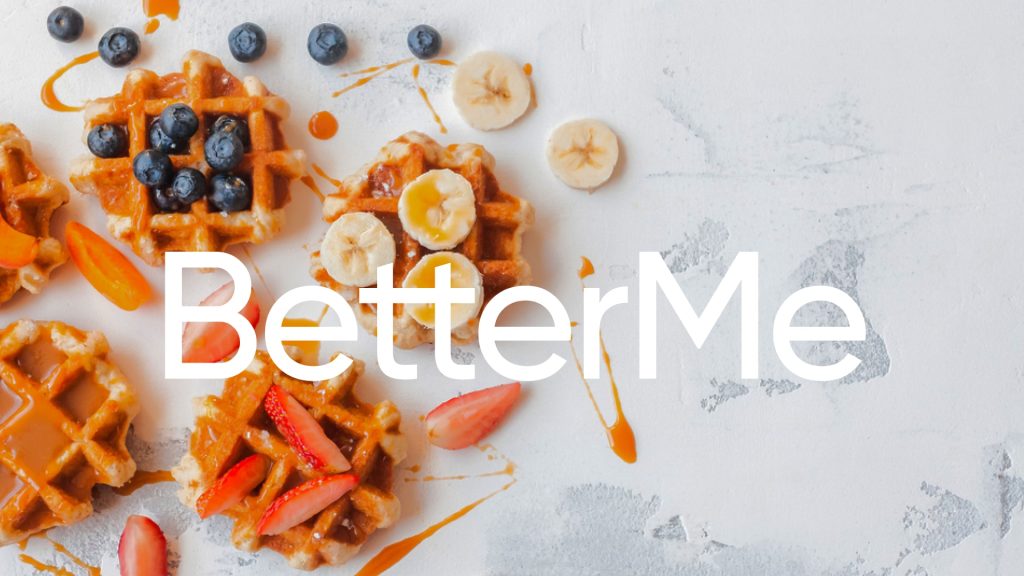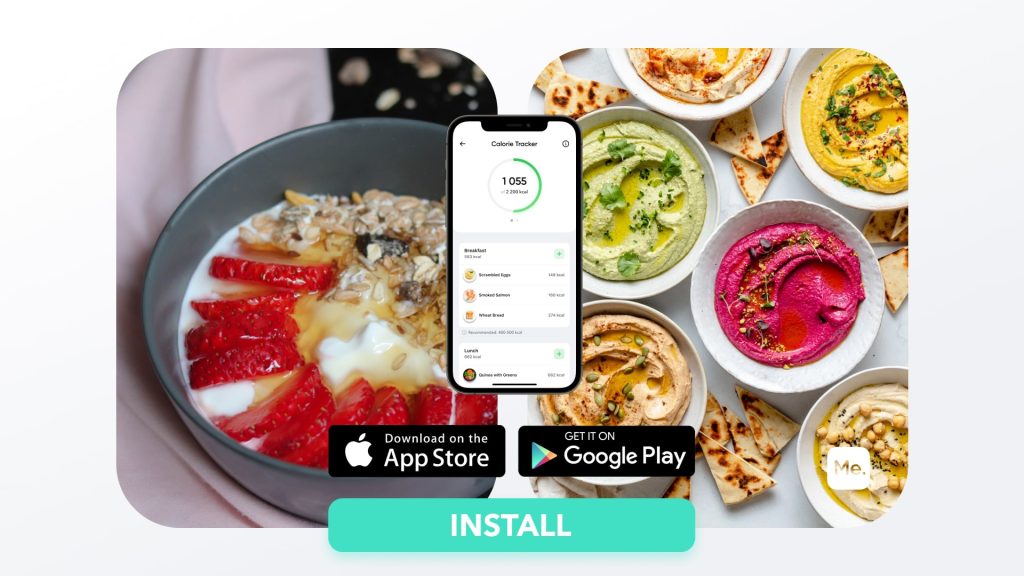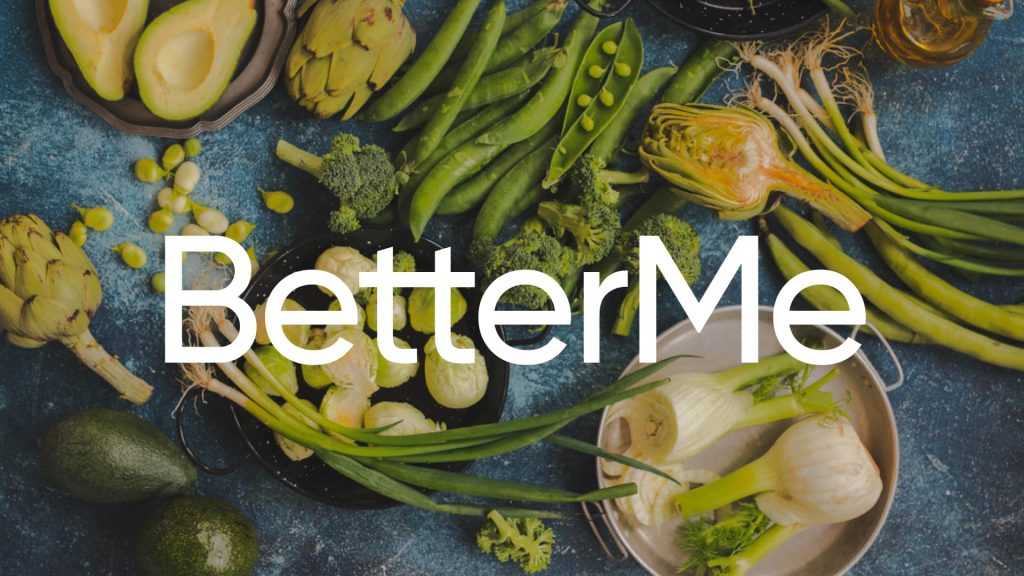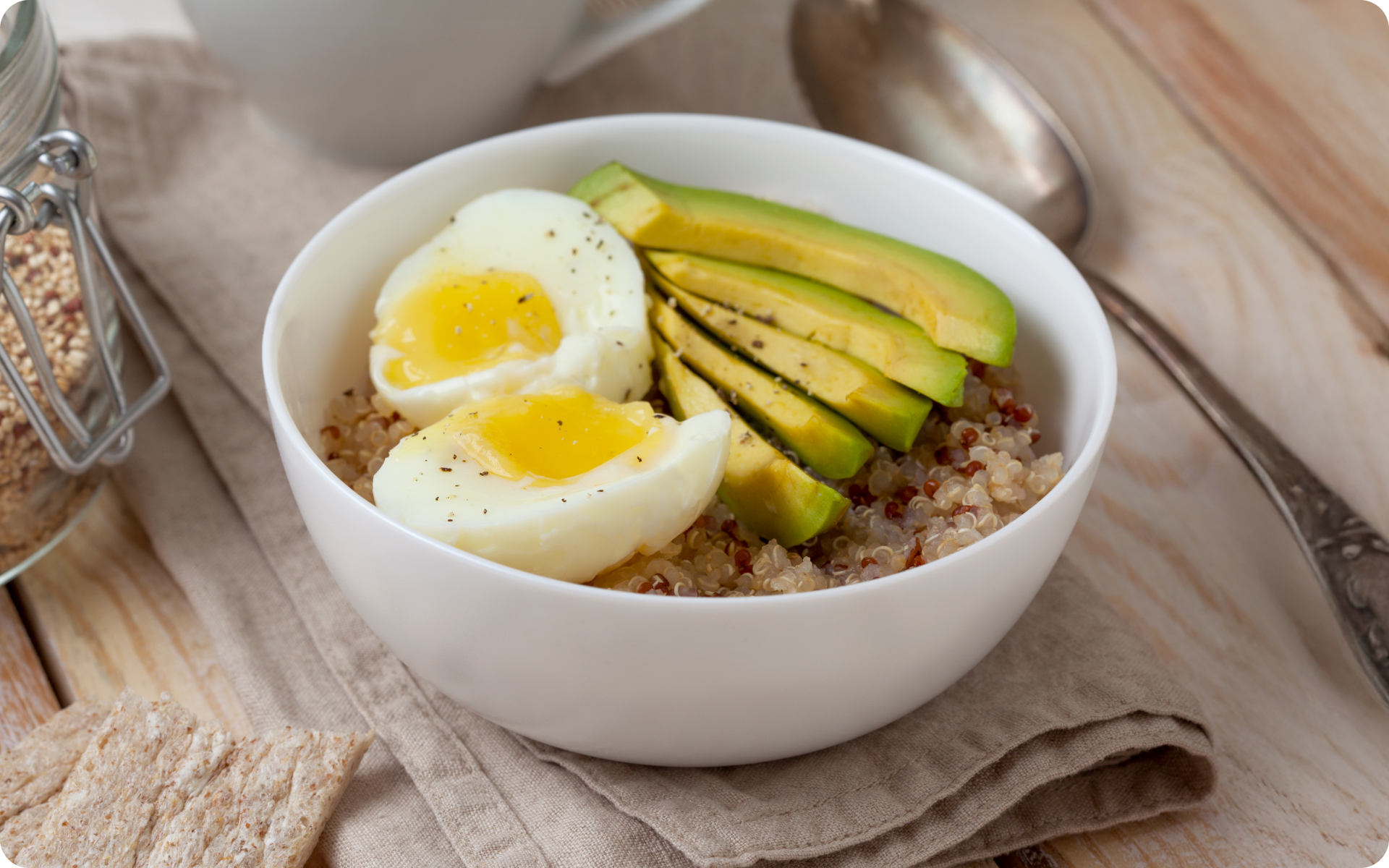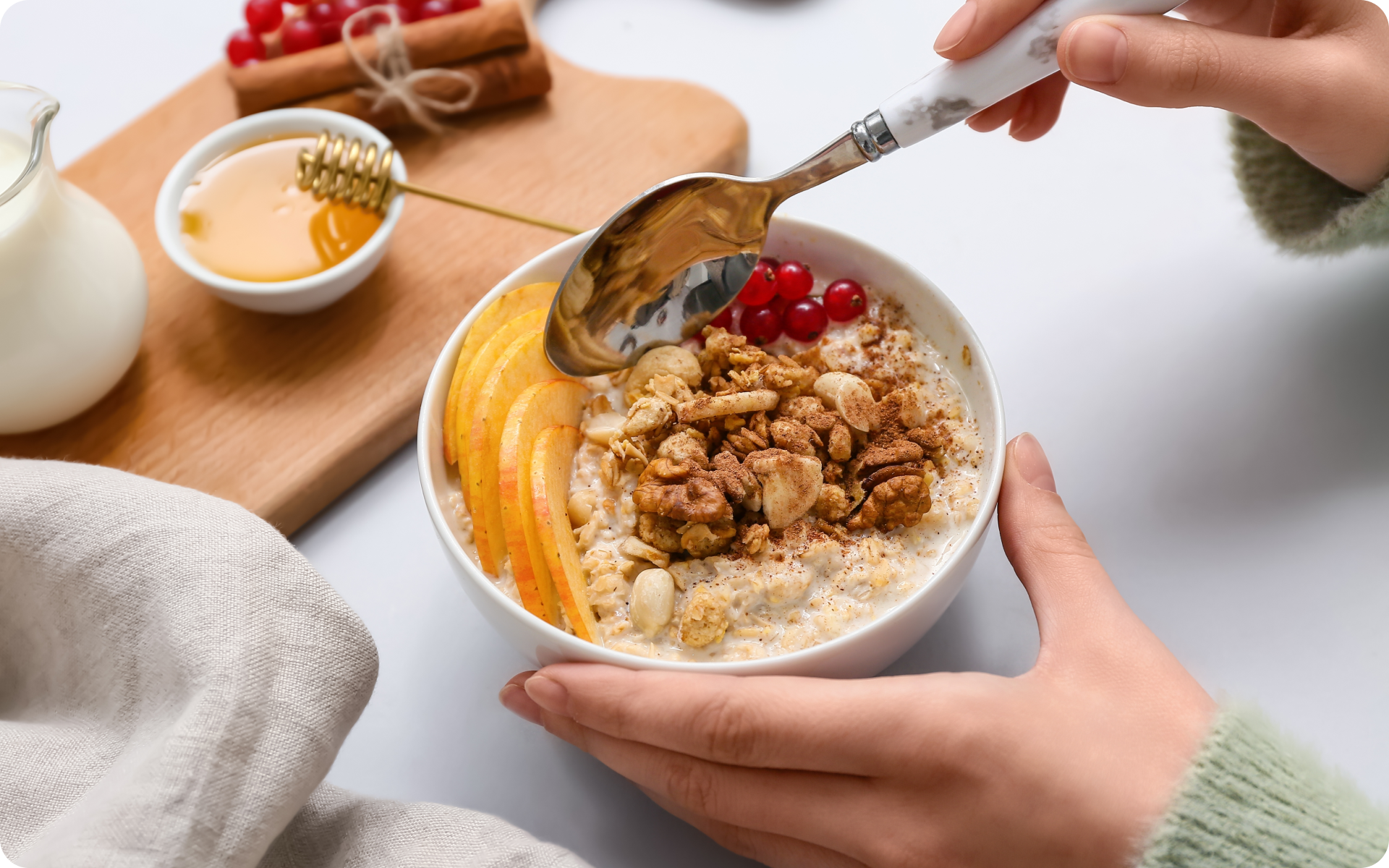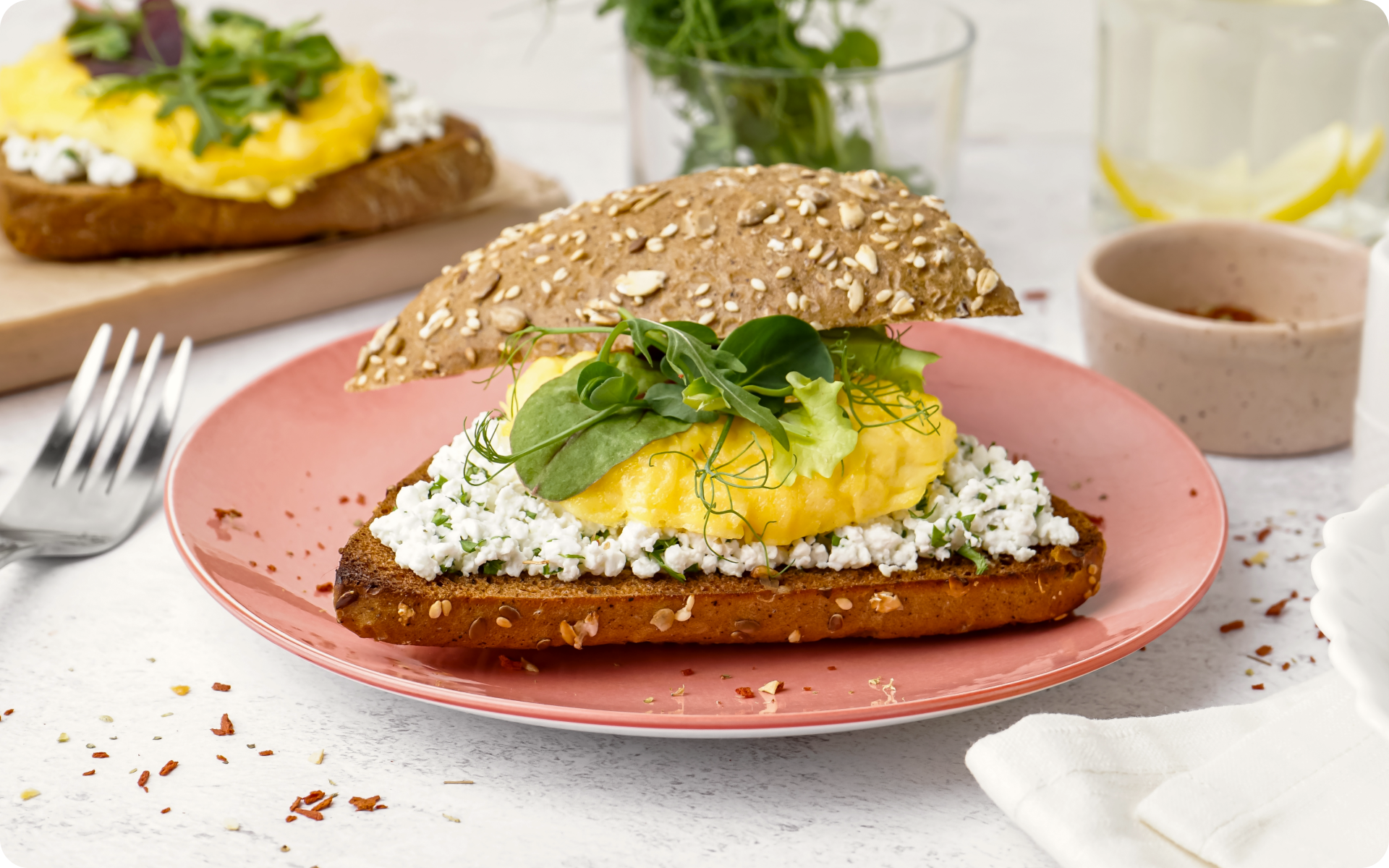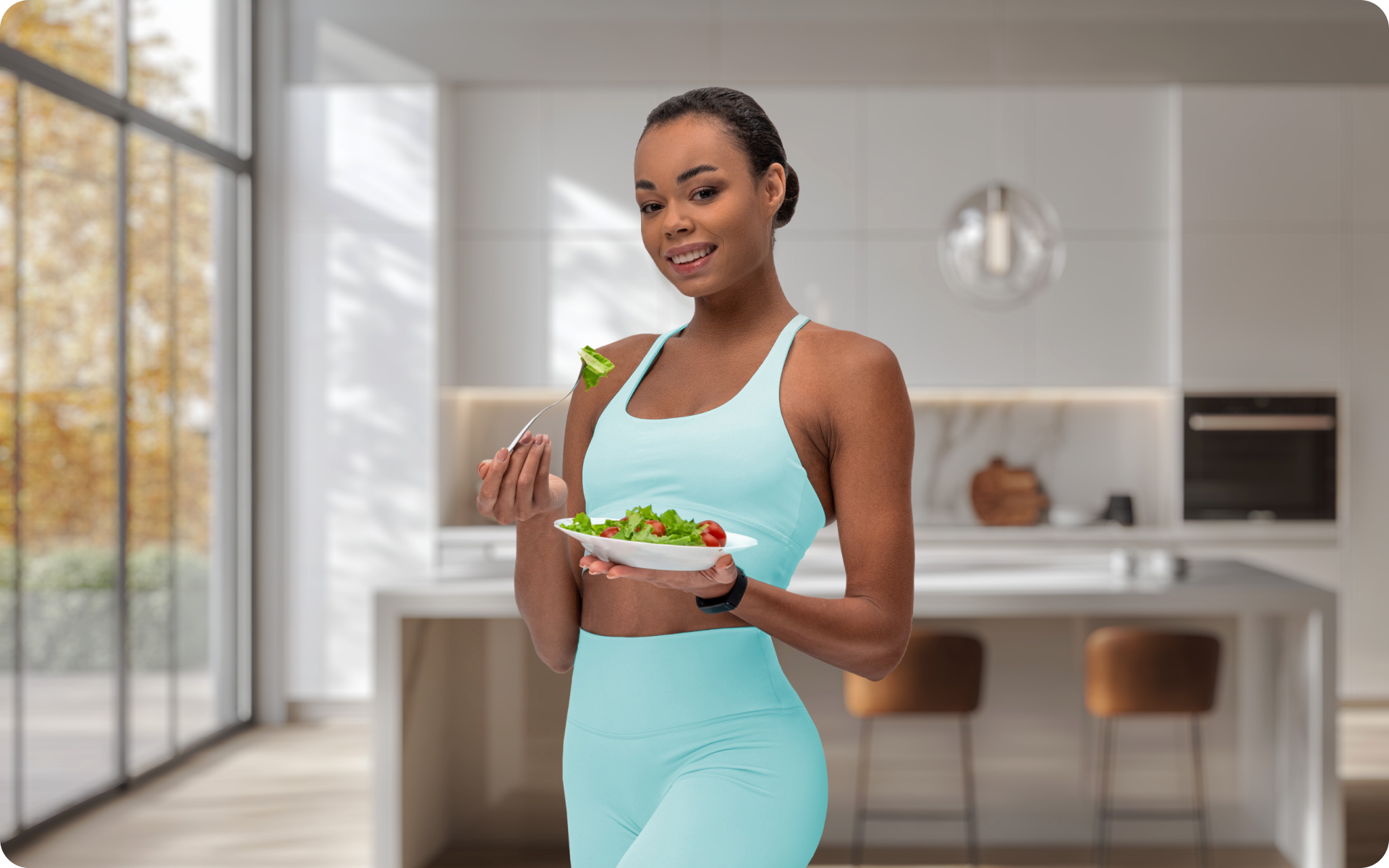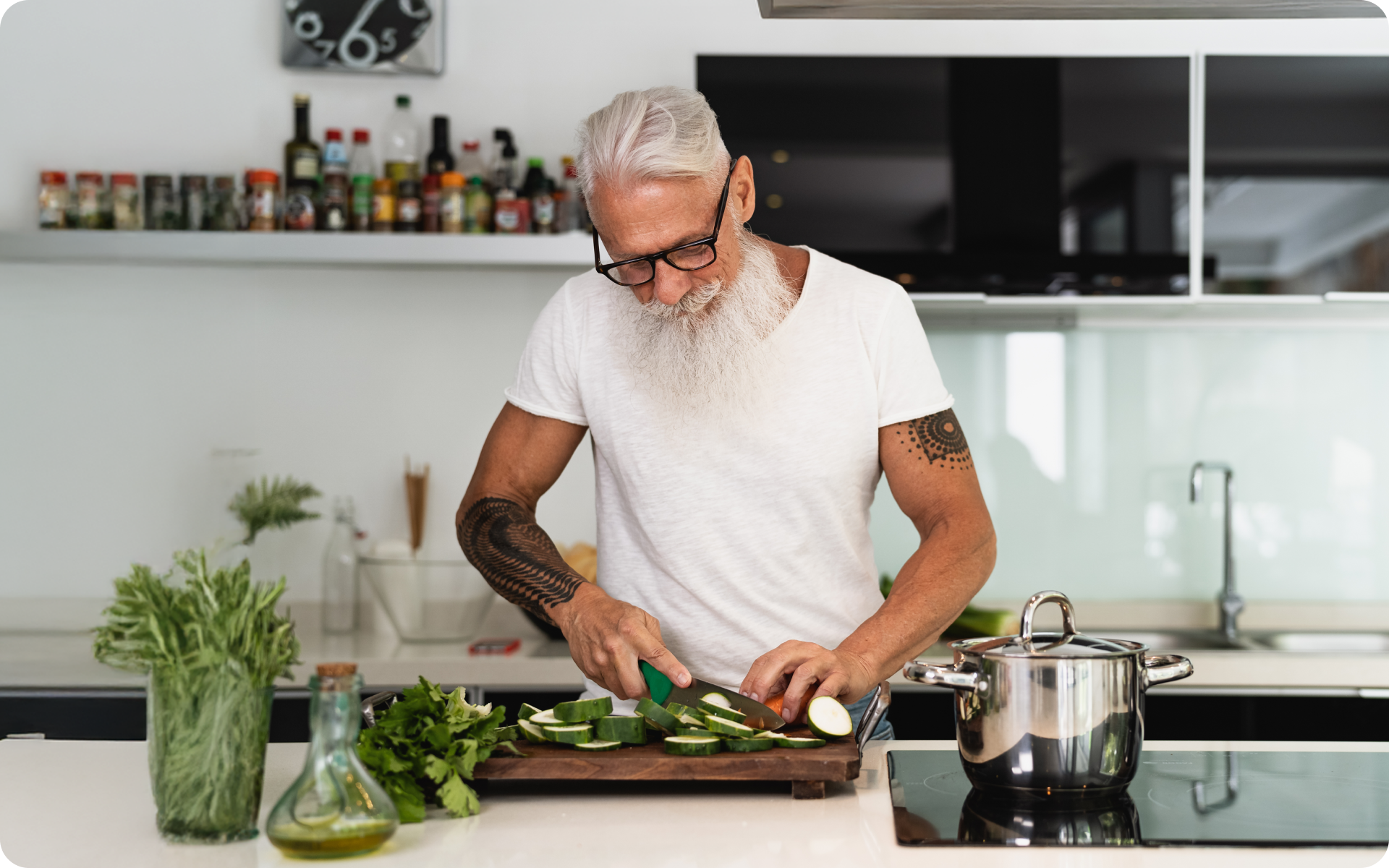What Is A Plant-Based Diet Meal Plan?
In the modern world, with high levels of stress, anxiety and health issues, it is especially important to take care of your body. It doesn’t matter whether you are trying to fight off excess pounds or some kind of disease, proper nutrition will always be beneficial. This could help to reduce cancer risks, manage diabetes, support your heart health and more (17). Luckily, today there is an abundance of various diets, and so you can find your perfect one. However, it is important to figure out all the benefits, risks and other peculiarities of the nutrition plan you are going to follow. In this article you will find information about a plant-based diet meal plan and then you can decide whether it is worth your attention. Let’s get started!
Get your personalized
meal plan!
A plant-based diet meal plan can be understood in several ways. First of all, there is no precise definition for this diet. Technically, a plant-based nutrition plan shouldn’t include meat – it’s vegetarian. But some people understand it as a completely vegan diet and strictly exclude all animal-based foods from their meal plan. That’s a little tougher variation of this diet. Some people also try the easiest type – they consume mainly plant-based foods, but don’t exclude meat completely. So, which to choose? Everything really depends on what levels of restrictions you can deal with and on your fitness goal. This article will focus on the most common variation of this nutrition plan – no meat, no dairy, only plant-based foods.
Plants-Based Diet Meal Plan: Benefits
-
Lose Weight In A Safe And Healthy Way
People, who stick to a plant-based diet, tend to have a lower body fat percentage. High fiber content in the foods included to your daily food intake will suppress your appetite and help you feel full longer.
-
Increase Your Fiber Intake
Fruits and vegetables have an extremely high content of fiber. Dietary fiber has an impressive number of health benefits. You already know that it helps to peel off unwanted pounds. It also helps one have healthier gut bacteria, prevents diseases, makes you feel full longer and improves digestion (2).
-
Lower Your Risks Of Chronic Diseases
This is again about fiber. It significantly lowers your risks of getting chronic diseases. For instance, people who follow this type of diet experience lowered LDL cholesterol levels. According to the studies, a plant-based diet could help improve fertility and lower the risks of type II diabetes. Another research study has shown that people who consume healthy plant-based foods, such as healthy oils, veggies, whole grain and more, have much lower risks of heart disease (4, 6, 14).
-
Find Easy Sources Of Protein
The plant based diet will definitely save you time. You don’t have to process salads, fruits and some other dishes. The same goes for protein sources. You don’t have to spend time grilling chicken breasts or steak. For instance, canned lentils and beans are healthy protein sources that will wait for their moment of glory on your shelf as long as needed. Just open the can, drain, rinse and that’s it! Nuts and seeds will become your perfect protein rich snack, that you can easily keep them in your bag until you get hungry. Quinoa and brown rice are perfect options as well, as they are easy and quick to cook.
Want to build an attention-grabbing bubble butt, blast away fat that’s stored in all the wrong places, spring-clean your diet, turn back the clock on your skin, skyrocket your self-confidence and shatter your insecurities? Check out the BetterMe app and set this plan in motion!
What To Buy On A Plant Based Diet Meal Plan?
Many beginners feel enthusiastic and motivated about their new dietary pattern, until they start thinking about a food list. Very often, people go to the grocery store and just don’t know what to buy. Below you can find a list of the most beneficial foods that will be a perfect option for your daily menu.
-
Fruits And Vegetables
Packed with essential vitamins, fruit and vegetables will form an integral part of your plant-based diet meal plan. You can opt for both fresh, canned and frozen variations. Fresh salads, smoothies or even a whole fruit or veggie for a snack will help you to stick to your diet and make it seem brighter and even more delicious.
You can choose any fruits you like – citrus fruits, berries (strawberries, blueberries, raspberries and more), bananas, apples and many others – they all will become a perfect addition to your diet. Leafy greens, tomatoes, carrots, beets, sweet potatoes, peppers and more – these veggies should become an important part of your meal plan.
Read More: Fruitarian Diet: Is Eating ‘Nature’s Candy’ For Breakfast, Lunch, And Dinner Healthy?
-
Whole Grains
It is hard to overestimate the benefits of whole grains. They are packed with antioxidants, fiber, protein, B complex vitamins, iron, zinc, copper magnesium and more (15). That’s why you can safely add them to your diet to make it well-balanced. Oatmeal, quinoa or brown rice are perfect for your daily menu.
-
Nuts And Seeds
Flax seeds, chia seeds, almonds, walnuts, hazelnuts – choose your preferred nuts and seeds. They can improve the taste and nutritional value of your dishes. Nuts can also be a nice way to get rid of hunger when you have no time to cook.
-
Legumes
Beans and lentils are a rich source of fiber and protein. They are easy to store and prepare and can be used to cook simple and delicious meals. Canned or dried – they still provide you with the same benefits.
-
Soy
To make your plant-based diet more protein-packed, you can try some edamame and tofu. They will also help to make your eating pattern more balanced.
The listed above foods are for people who stick to completely plant-based diets. If you have decided to try variations that include animal-based foods, you should also make smart choices. Opt for lean cuts of meat, seafood, low-fat or fat-free dairy, eggs and honey in limited amounts. Make sure to cook these foods in a healthy way, with minimum fats. It’s better to grill, roast or steam them to get as many benefits as possible. As for the drinks, you can drink juices (no sugar added), water, unsweetened tea (green, lavender, chamomile and more) and coffee.
There are foods you should limit. If you have chosen a vegan variation, you should limit meat, dairy, eggs, milk and other animal products. Processed animal meats (for instance, sausages), highly processed foods, all kinds of sweets, sweetened beverages are also a no-no for the supporters of the plant-based diet.
How To Get Started?
For some people it might be hard to start a completely new diet. If they do it too abruptly, very soon they can give up the diet because of cravings for meat, dairy and other animal-related products. That is why most dieters should start gradually. For instance, you can fill half of your lunch and dinner plate with veggies. Make sure you add different colors – in this way you’ll consume a wider variety of vitamins.
Another trick is to eat vegetables as a snack, with some delicious dipping sauce (hummus or salsa will be a perfect option). If it is hard for you to remove meat from your menu, you could also do it gradually. Eat smaller amounts and use it not as a centerpiece but as a garnish. Make sure you opt for healthy fats – avocados, nuts and seeds, olives, olive oil and more are suitable. Eat whole grains for breakfast to get enough energy. Quinoa or oatmeal with nuts or banana will keep you satisfied till the next meal. You can have your fruits for dessert. In this way you won’t eat too much of them and will get necessary nutrients. As for the preparation, you can grill, stir, steam, braise and stir-fry your veggies or eat them in a fresh salad.
Sample: A Plant-Based Diet Meal Plan For Weight Loss
Yes, the variety of foods you can include to your meal plan is rather wide and your menu is up to your imagination and preferences. However, below you can find an easy 1,500-calorie one-week plant-based diet meal plan for beginners (1, 3, 11). You can also see calories for each meal and a total amount of consumed calories for each day. Read on!
-
Day 1
Breakfast
Enjoy a 1/3 cup of quinoa and chia oatmeal. To cook you breakfast, mix together 2 cups of old-fashioned rolled oats, 1 cup of quinoa, 1 cup of rolled wheat, 1 cup of dried fruit, ½ cup of chia seeds, 1 teaspoon of ground cinnamon and a pinch of salt. Take 1/3 cup of the mixture and add 1/4 cups water (or unsweetened soy milk), bring to a boil, simmer for 12-15 minutes until thickened. Leave covered for 5 more minutes, add 3/4cup of blueberries. That will be 360 calories.
Snack 1
For your first snack eat one medium apple and a tablespoon of peanut butter – 190 calories.
Lunch
For lunch you can try a whole wheat veggie wrap. The preparation won’t take much time and effort. You’ll need 1 8-inch sized tortilla, ¼ of mashed avocado, 1 cup of sliced veggies (take your favorite ones), and 2 tablespoons of hummus. Spread hummus and avocado puree on tortilla, add veggies and roll up. That’s it! This dish has 285 calories.
Snack 2
Eat 1/4 cup of dry-roasted unsalted almonds – 206 calories.
Dinner
Try to cook stuffed sweet potato with hummus. You’ll need 1 large sweet potato, ¼ cup of hummus, 1 cup of canned black beans and ¾ cups of chopped kale. Prick the potato with a fork, microwave it up to 10 minutes on high, until it is cooked. Steam kale and beans, adding 2 tablespoons of water. “Open” the sweet potato and add kale and beans in it. Mix hummus with 2 tablespoons of water in a small bowl to make a sauce and drizzle your dish (13). That will be 472 calories.
Total calorie intake – 1513 calories.
Read More: 7 Day Grapefruit Diet For Weight Loss: Benefits, Cons, And A Sample Meal Plan
-
Day 2
Breakfast
Peanut butter and chia pudding will be a nice option for your breakfast. You’ll need ½ tablespoon of cocoa powder (unsweetened), 1 cup of almond or coconut milk, 1 tablespoon of peanut butter and 3 tablespoons of chia seeds. Take a jar and mix peanut butter, milk and cocoa powder, add chia seeds and leave it in a fridge overnight (10). That’s it! You’ll get 415 calories.
Snack 1
Opt for ¼ cup of pumpkin seeds, that will be 228 calories.
Lunch
Vegan potato salad can become a perfect lunch for you. Boil about 20 ounces (600 grams) of baby new potatoes. It is better to halve them. Place them in a bowl, add 2 teaspoons of white wine vinegar, the same amount of extra virgin olive oil, some salt and pepper, mix and wait until it cools down. Add about 4 ounces (120 grams) of vegan mayonnaise, 1 ½ teaspoons of Dijon mustard, 1 finely chopped shallot, 2 teaspoons of capers, and a handful of chopped parsley and chives (16). That’s it! Divide your salad into four equal parts to get one serving. One serving will have 317 calories.
Snack 2
Eat 2 cups of air-popped popcorn. To improve the flavor, add a tablespoon of olive oil and a tablespoon of nutritional yeast. You’ll consume 202 calories.
Dinner
This meal is usually classified as a snack, but its high protein content allows to eat it as a major meal. Hummus and pita dinner will keep you full longer. Place 4 tablespoons of hummus into a bowl, cut one large whole-wheat pita and enjoy your 310-calorie dinner.
Total calorie intake – 1472 calories.
-
Day 3
Breakfast
For breakfast eat 1 cup of oatmeal, cooked with 2 cups of water, ½ cup of raspberries and 1 tablespoon of chopped walnuts. You’ll get 450 calories.
Snack 1
For your first snack eat one medium apple – 95 calories.
Lunch
A whole wheat veggie wrap as on the first day will be a nice option for lunch – 345 calories.
Snack 2
Eat a cup of edamame pods with a small amount of salt. This will be 200 calories.
Dinner
Cook green salad with edamame beans. Mix 2 cups of mixed salad greens, 1 cup of shelled thawed edamame and a shredded half of a medium beet. Prepare salad dressing by mixing 1.5 tablespoons of red-wine vinegar, 1 tablespoon of chopped cilantro, 2 teaspoons of extra-virgin olive oil and some black pepper (5). Combine the salad with the dressing and enjoy! This dish will provide you with 325 calories.
Total calorie intake – 1415 calories.
-
Day 4
Breakfast
For breakfast opt for two low-fat whole-grain waffles, 2 tablespoons of chopped pecans and a half of banana. You’ll get 300 calories.
Snack 1
Eat 2 cups of air-popped popcorn with olive oil and nutritional yeast, according to the mentioned above recipe. In this way you’ll consume 202 calories.
Lunch
Eat vegan potato salad (317 calories), as on the day 2.
Snack 2
Eat 1/4 cup dry-roasted unsalted almonds to get 206 calories.
Dinner
Cook stuffed sweet potato with hummus (read the recipe above) – 472 calories.
Total calorie intake – 1497 calories.
-
Day 5
Breakfast
Eat ½ cup of quinoa and chia oatmeal, the same as you ate on the first day – 360 calories.
Snack 1
Opt for ¼ cup of pumpkin seeds, that will be 228 calories.
Lunch
Cook hummus and veggie sandwich. You’ll need 2 slices of whole grain bread, ¼ mashed avocado, ½ cup of mixed salad greens, ¼ of sliced medium bell pepper, 3 tablespoons of hummus, 1/4 cup of sliced cucumber and the same amount of shredded carrot. Spread 1 slice of bread with avocado, and the second one with hummus. Place greens and veggies on one slice of bread and cover with the other one. Such a sandwich has 325 calories.
Snack 2
Eat 1 medium sized peach and 1/3 cup dried walnut halves. This snack has 274 calories.
Dinner
Repeat your hummus and pita dinner – 310 calories.
Total calorie intake – 1497 calories.
-
Day 6
Breakfast
For breakfast eat waffles with chopped pecans and a half of banana, as on day 4. You’ll get 300 calories.
Snack 1
Try one hard-boiled egg with ¼ of sliced avocado. Season with salt and pepper to improve the taste. This meal has 158 calories.
Lunch
Opt for a delicious veggie salad with hummus. Mix ½ cup of rinsed chickpeas, ½ cup of cooked quinoa and 2 cups of mixed salad greens. Prepare dressing of 1 tablespoon of chopped roasted red pepper, 2 tablespoons of hummus and 1 tablespoon of lemon juice. Mix everything well, add 1 tablespoon of sunflower seeds, the same amount of parsley, some salt and pepper (12). One serving is 3 ½ cups and has 379 calories.
Snack 2
Eat a cup of edamame pods with a small amount of salt – 200 calories.
Dinner
Cook stuffed sweet potato with hummus (find the recipe above) – 472 calories.
Total calorie intake – 1509 calories.
-
Day 7
Breakfast
For breakfast eat 1 cup of oatmeal, cooked with 2 cups of water, raspberries and chopped walnuts, as on the day 3 – 450 calories.
Snack 1
Eat one medium apple and a tablespoon of peanut butter – 190 calories.
Lunch
Cook hummus and veggie sandwich – 325 calories.
Snack 2
Eat 1 cup of cucumber slices with hummus – 137 calories.
Dinner
Cook green salad with edamame beans, as on the day 3 – 325 calories.
Total calorie intake – 1427 calories.
Plant Based Diet Meal Plan: Small Tips For Your Success
It is a nice trick to choose two or three ideas for dinner or lunch, cook higher amounts of food and eat them throughout a week. Choose two or three days when you have enough time to cook and eat the leftovers for the rest of the week. In this way you won’t focus too much on what to cook everyday and won’t feel stressed because of it. You can focus mainly on dinner and choose the simplest recipes for your breakfasts, lunches and snacks. This will help you to save time. When you get used to your new dietary pattern, you will be able to make your menu more diverse and choose many other recipes (19).
When it comes to weight loss, progress is made by inches, not miles, so it’s much harder to track and a lot easier to give up. BetterMe app is your personal trainer, nutritionist and support system all in one. Start using our app to stay on track and hold yourself accountable!
FAQs
Are There Any Potential Risks And Disadvantages Of A Plant-Based Diet Meal Plan?
Despite the fact that this diet isn’t over restrictive, and you still can get necessary nutrients, there are some pros and cons of this diet. First, you should know that when you change your usual menu and start sticking to a plant-based diet, you might experience some problems with digestion. Diarrhea or constipation are totally normal in this case. It happens because of high intake of fiber that can be found in fruits and veggies. It normalizes bowel movements and improves the work of the digestive system, but at first it might cause discomfort until your system adjusts.
The second thing is that if you stick to a plant-based diet, it doesn’t mean that all plant-based foods are suitable for your daily menu. You still have to make smart eating choices. French fries and potato chips are plant-based foods, but they could definitely stop you from reaching your fitness goal. You should opt for high quality healthy foods to lose weight and support your health.
Another important thing to remember is that even if your diet consists of healthy fruits, veggies, whole grains and so on, you still have to control your daily energy intake. There is the one main rule for weight loss and gain. If a total amount of calories you consume per day is higher than the amount of calories you burn, you’ll gain weight (and vice versa). You cannot eat fruit all day long and lose weight. That’s why you should make sure you don’t overeat healthy foods and control portion sizes in your plate (9).
How Many Calories Should I Consume On This Diet?
Of course, the amount of calories you have to burn depends on a number of factors. For instance, your age and size are quite important in this case. However, on average, to lose one pound of excess weight per week, it is recommended to consume 500 calories less than your daily energy requirements. In addition to lowered calorie intake it is also recommended to perform 45 minutes of moderate to high intensity workouts a day (7). Anyway, to determine your accurate energy intake it is better to consult a dietitian or use an online calculator.
Is A Plant-Based Diet Healthy?
Yes, this type of diet doesn’t look over restrictive and seems to be safe and healthy. However, even in this case it is important to be careful. Such eating patterns are healthy as long as they are well-balanced. Make sure to include different food groups – fruits, veggies, whole grains, legumes and more. Don’t focus on the vegetables only – this could lead to nutrient deficiency.
There are a number of nutrients you should focus on to support normal functioning of your body. They include protein vitamin B12, vitamin D, calcium, omega-3 fatty acids. These are vital for your overall health and bone density. Some people opt for taking a supplement to make sure they get all the necessary nutrients. If you decide to try this method, you should talk to your health professional to figure out whether you need a supplement and which one will be the best for you (18).
Conclusion
In conclusion, as you can see, a plant-based diet meal plan is a safe way to support your overall health and trim off unwanted inches from your waistline. However, make sure to talk to your doctor or dietitian before starting a new dietary pattern. Despite the fact that the plant-based nutrition plan is healthy, all people are different and can react to this lifestyle adjustment in a different way.
If you aim to lose weight, it is also important to involve healthy sleep, proper hydration and most importantly – regular physical exercises. For adults, it is recommended to get a minimum 150 minutes of moderate aerobic activity (75 minutes, if you opt for high intensity workouts) (8). As for the strength exercises for major muscle groups, two times a week will be enough. In this way you’ll get desired results in a short period of time and strengthen your entire body. Remember to take care of yourself and stay healthy.
DISCLAIMER:
This article is intended for general informational purposes only and does not address individual circumstances. It is not a substitute for professional advice or help and should not be relied on to make decisions of any kind. Any action you take upon the information presented in this article is strictly at your own risk and responsibility!
SOURCES:
- 7-Day Vegan Sugar-Detox Meal Plan: 1,500 Calories (2019, eatingwell.com)
- 10 Amazing Health Benefits of Eating More Fiber (2016, eatingwell.com)
- 15 Easy 300 Calorie Breakfast Ideas (2020, verywellfit.com)
- A plant-based diet for the prevention and treatment of type 2 diabetes (2017, ncbi.nlm.nih.gov)
- Green Salad with Edamame & Beets (2017, eatingwell.com)
- Healthful and Unhealthful Plant-Based Diets and the Risk of Coronary Heart Disease in U.S. Adults (2017, pubmed.ncbi.nlm.nih.gov)
- How Many Calories Should I Eat in a Day? (2020, verywellfit.com)
- How much should the average adult exercise every day? (2019, mayoclinic.org)
- Is there such a thing as eating too many fruits and vegetables? (2012, sciencedaily.com)
- Peanut Butter Cup Chia Pudding (2019, verywellfit.com)
- Plant-Based Meal Plan for Beginners (2020, eatingwell.com)
- Quinoa Chickpea Salad with Roasted Red Pepper Hummus Dressing (2017, eatingwell.com)
- Stuffed Sweet Potato with Hummus Dressing (2017, eatingwell.com)
- The Influence of Diet on Fertility and the Implications for Public Health Nutrition in the United States (2018, ncbi.nlm.nih.gov)
- Tips for Reaping the Benefits of Whole Grains (2011, webmd.com)
- Vegan potato salad (n.d., bbcgoodfood.com)
- What are the benefits of eating healthy? (2018, medicalnewstoday.com)
- What is a plant-based diet? (2018, bbcgoodfood.com)
- What is a plant-based diet and why should you try it? (2018, health.harvard.edu)
